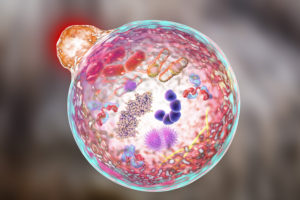I f there’s one key cellular function that contributes more to longevity, it’s the autophagy process. Yes, that means that our cells eat themselves and it’s how the body rids itself of old and damaged materials. In this process, an old cell is broken down and it’s chemical components are recycled for use in building new cells.
f there’s one key cellular function that contributes more to longevity, it’s the autophagy process. Yes, that means that our cells eat themselves and it’s how the body rids itself of old and damaged materials. In this process, an old cell is broken down and it’s chemical components are recycled for use in building new cells.
It is the body’s way of detoxifying cells. As nature has it, autophagy slows down as we age. But there are things we can do to stimulate it.
What Is Autophagy?
- The word autophagy comes from the Greek for “self” and “phagein”, which means “to eat”
- It is the process by which cells degrade and recycle their components
- It provides fuel for energy and building blocks for cell renewal
- After infection, autophagy can destroy bacteria and viruses
- Cells use autophagy to get rid of damaged proteins and organelles, to counteract the negative effects of ageing on the body
In my previous post on Why We Age, I presented the theories of aging. But even without understanding what free radicals, oxidative stress, and mitochondrial dysfunctions are, you can learn how to shift your lifestyle habits to slow down the rate of aging. And the biggest, fastest way to do this is by kick-starting autophagy.
In 2016, Japanese scientist Yoshinori Ohsumi won the Nobel Prize for his discoveries into the mechanisms of autophagy. These have led to a better understanding of diseases such as Parkinson’s and dementia.
Fasting Turns On Autophagy
Since then, drug companies and academics have raced to find drugs that will stimulate the process. And of course, the weight-loss and wellness experts are claiming that the process can be induced naturally by fasting, high-intensity exercise and restricting carbohydrates. It’s too early to tell, but that could be good news for seniors.
There are a number of experts who recommend periodic fasting for health because it stimulates autophagy. Author P.D. Mangan in Stop the Clock says this:
In the fasted state, with no food being taken, autophagy is strongly up-regulated, allowing cells to rid themselves of accumulated junk. Maintaining autophagy levels in their youthful state is critical for lifespan extension. It’s very useful in the prevention and treatment of Alzheimer’s and Parkinson’s diseases.
It may seem normal to go without eating between dinner and breakfast, sure. But how many of us do that? I, for one, snack after dinner or before going to bed. I’ve managed to break that habit but I had to consciously become aware I was doing it.
Rob doesn’t eat in the morning, so he goes without eating 15-16 hours until lunch the next day. That is what’s called intermittent fasting, and it’s a growing trend among healthy people who want to give their bodies extra time to metabolize and rebuild.
Intermittent Fasting Turns On Autophagy
That’s how the body responds to no food: it sets in motion the autophagy process, which not only gets rid of junk and decaying cell, but also recycles important chemicals to the liver for reuse.
Intermittent fasting is a good way to get the benefits of calorie restriction without having to diet or, for that matter, lose weight (unless you want to.) You simply go without eating for 12-16 hours, then you can eat normally.
I’m intrigued. I’ll write more in my next post. Some experts say you can drink bone broth and other liquids such as coffee and tea. To me, that seems doable. What do you think? Have you tried fasting?

Recent Comments